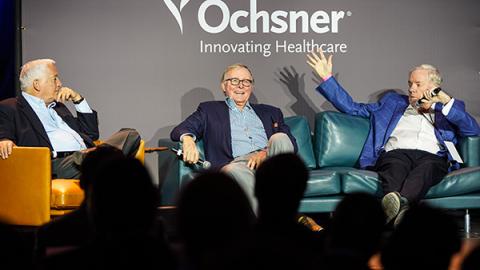Internet pioneers highlight NOEW 2019

Netscape Communications Corp. revolutionized computing in 1994 with the release of the world’s first commercial web browser, igniting the World Wide Web and laying the foundation for today's online world. But in a talk presented by New Orleans Entrepreneur Week, company founder Jim Clark said he still regrets not developing one key feature.
“The worst thing about Netscape is that we didn’t properly implement user authentication,” said Clark, who led the company from its founding until it was acquired by AOL in 1999. “As a consequence, everyone began using passwords and here we are. Getting rid of passwords is an important thing to bring about. We all hate them, and there’s a better way to do it.”
On Friday, March 29, Clark and Jim Barksdale, Netscape’s founding CEO, shared their recollections of the company’s meteoric rise in a New Orleans Entrepreneur Week keynote presentation, “How the First Wave Informs the Third.” The talk, moderated by Walter Isaacson, professor of history at Tulane University, took place at the Ace Hotel as part of the NOEW Summit, the two-day conference that caps off the weeklong celebration of entrepreneurship and business innovation.
This year’s edition of NOEW was co-produced by the A. B. Freeman School of Business, lending a decidedly Tulane flavor to the proceedings. The NOEW Summit alone featured more than 30 presenters with Tulane connections, including faculty, alumni and parents.
“One of our objectives this year was to bring Tulane’s expertise to a wider audience,” said Rob Lalka, executive director of the Freeman School’s Lepage Center for Entrepreneurship and Innovation, which coordinated the event. “I had hoped we’d accomplish that goal considering the caliber of this year’s speaker lineup, but based on how much our students, alumni and local entrepreneurs have all been raving about the event, I think we exceeded those expectations.”
Clark and Barksdale delivered what amounted to an oral history of Netscape, from Clark's first meeting with Marc Andreessen, the 22-year-old computer whiz who became the company's co-founder, to its groundbreaking IPO in 1995, which changed the rules of Wall Street and ushered in the dot-com era.
Despite the success of the offering, which left the fledgling company with a market value of $2.1 billion, Clark bristles at the notion that Netscape was part of the tech bubble.
“Netscape had $70 million in revenues in its first year,” Clark said. “In 1996, we had $250 million, and in 1997, $500 odd million. And profitable the whole way. I point that out because we were not the company that led the dot-com bust. We led the dot-com boom.”
After spending the better part of an hour discussing the past, Isaacson wrapped up the session by asking Barksdale and Clark to think about the future. What's the next next big thing?
Barksdale, who sits on the board of In-Q-Tel, a nonprofit venture capital firm that invests exclusively in companies serving the needs of the intelligence community, said one need looms over all others: artificial intelligence.
“The Chinese are investing something like $1.5 billion a year in just the research development of artificial intelligence,” Barksdale said. “We need to get off our ass and get to work in that field. That’s a hard thing to do, but once people realize there’s a lot of money to be made in different aspects of using AI, they will want to get in on it just like the Internet boom.”
“There’s an old aphorism I’ve heard Jim Barksdale say many times.” Clark added. “The main thing is to always keep the main thing the main thing. No matter what your persuasion is, we’re not keeping the main thing the main thing as a country. We’re not funding properly the National Science Foundation — we don’t even believe in science. That, to me, is how we keep the main thing the main thing.”
Clark and Barksdale's keynote was one of more than 60 talks presented as part of the NOEW Summit. Presenters ranged from Freeman School professors like Jasmijn Bol, Claire Senot and Peter Ricchiuti to national thought leaders like Marcus Lemonis, host of CNBC’s “The Profit,” Jim Coulter, co-founder of TPG Capital, and K. Shelly Porges, co-founder and managing partner of the Billion Dollar Fund for Women.
The week also included a variety of pitch contests. Tulane students Marco Nelson (MBA ’19) and Lydia Winkler (L ’19) took home the week’s biggest prize — a $50,000 equity investment — by winning first place in IDEAPitch, a showcase for NOEW's breakout startups. Nelson and Winkler earned the prize with their pitch for RentCheck, an app that streamlines the security deposit process for both tenants and landlords. RentCheck is also a finalist in this year’s Tulane Business Model Competition.
Interested in advancing your education and/or career? Learn more about Freeman’s wide range of graduate and undergraduate programs. Find the right program for you.
Other Related Articles
- Forbes: How To Talk Politics With Family Over The Holiday
- AI-powered fund takes top prize in Aaron Selber Jr. Hedge Fund Course
- De Franco appointed Keehn Berry Chair of Banking and Finance
- The Wall Street Journal: For Trump, the Warner Megadeal Talks Are All About CNN
- Research Notes: Matthew Higgins
- NBC News: Elon Musk has left the White House, but he hasn't left politics behind on X
- NOLA.com: Louisiana venture capital firms, once an afterthought, are big funders of local startups now
- New Goldring Institute director hopes to expand international partnerships
